Choosing the Best Email Buddy – Shopify Email vs Mailchimp
Have you ever considered which tool could elevate your email productivity to the next level? well in this comprehensive guide we’ll dive into the Shopify Email vs Mailchimp debate, dissecting each platform’s features, pricing, and performance to help you make an informed decision. Whether you’re just starting out or looking to switch providers, understanding the nuances of these powerful tools is key to maximizing your email marketing potential and driving sales. So, let’s explore what Shopify Email and Mailchimp have to offer and find out which service can best propel your business forward. 🚀
Table of Contents
1. Ease of Use: Shopify Email vs Mailchimp
When it comes to Ease of Use, both Shopify Email vs Mailchimp offer user-friendly experiences, but they cater to different needs.
Shopify Email is designed with simplicity in mind, providing a straightforward approach to email marketing. It’s integrated directly into the Shopify admin panel, making it incredibly convenient for those already using Shopify for their e-commerce platform. The drag-and-drop editor allows for easy creation of email campaigns without the need for extensive technical knowledge. This ease of integration and use makes Shopify Email an excellent choice for Shopify store owners looking to start their email marketing efforts quickly and efficiently.
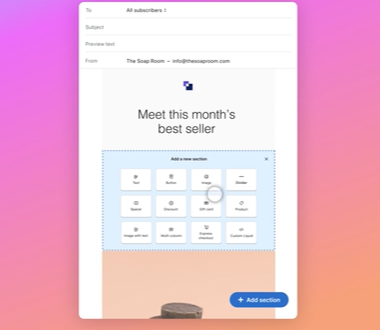
Mailchimp is known for its robust feature set and flexibility. It offers advanced features, extensive automation capabilities, and a wide range of integrations. While Mailchimp has a steeper learning curve compared to Shopify Email, it provides more in-depth customization options for those who require a more comprehensive email marketing solution. The platform’s user interface is clear and intuitive, but it may take some time to navigate and master all the features available.
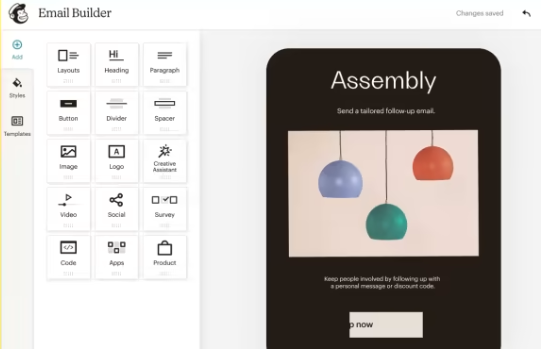
In summary, if you’re looking for an email marketing tool that’s easy to set up and use within your Shopify store, Shopify Email is the way to go. However, if you need more advanced features and are willing to invest time into learning the platform, Mailchimp might be the better option. Both platforms have their merits, and the choice ultimately depends on your specific business needs and technical comfort level.
2. Features: Shopify Email vs Mailchimp
When evaluating the Features of Shopify Email vs Mailchimp, it’s clear that both platforms offer a range of tools designed to enhance your email marketing campaigns.
Shopify Email is seamlessly integrated into the Shopify platform, which means users can easily access and utilize its features without leaving their Shopify admin panel. It provides essential email marketing tools such as customizable templates, which are straightforward to use with their drag-and-drop editor. Shopify Email’s features are particularly tailored for e-commerce, with options to include products, discounts, and gift cards directly in the emails.
Mailchimp, on the other hand, stands out with its comprehensive set of features that cater to a broader range of marketing needs. It offers advanced segmentation, A/B testing, and detailed analytics that go beyond basic email marketing. Mailchimp’s robust automation capabilities allow for the creation of complex customer journeys, and its extensive integration options make it a versatile choice for businesses that use multiple platforms.

In essence, Shopify Email is ideal for Shopify store owners who need a straightforward, integrated solution for their email marketing, while Mailchimp offers a more extensive suite of features for those who require a more sophisticated approach to their marketing strategies. The choice between Shopify Email and Mailchimp will depend on the specific needs of your business and how these features align with your marketing objectives.
3. Integration: Shopify Email vs Mailchimp
In the Integration aspect of Shopify Email vs Mailchimp, both platforms offer distinct advantages depending on your e-commerce setup and needs.
Shopify Email boasts a seamless integration with the Shopify platform, which is its most significant advantage. For Shopify store owners, this means being able to manage their email marketing campaigns directly from the Shopify admin panel without the need for additional software or plugins. This direct integration simplifies the process, allowing for quick access to customer data and product details that can be used to personalize emails.

Mailchimp, while no longer directly integrated into the Shopify store, still offers a robust solution through third-party integrations. It can connect to Shopify via automation platforms, allowing users to sync their store data with Mailchimp. This enables the creation of targeted campaigns based on purchase history and customer behavior. Mailchimp’s extensive range of integrations with other apps and services also means that businesses can create a more customized and automated marketing workflow.
Ultimately, Shopify Email is ideal for those who prefer a straightforward, built-in solution with minimal setup, while Mailchimp caters to those who require a more flexible system with a wide array of integration possibilities. The decision between Shopify Email and Mailchimp will depend on the level of integration complexity your business is comfortable with and the other tools you wish to incorporate into your email marketing strategy.
4. Pricing: Shopify Email vs Mailchimp
When it comes to Pricing for Shopify Email vs Mailchimp, understanding the cost structure of each platform is crucial for businesses to make an informed decision.
Shopify Email offers a straightforward pricing model. All Shopify users receive 10,000 free emails per month, which is often sufficient for small to medium-sized businesses. If you need to send more emails, the cost is $1 for every additional 1,000 emails up to 300k subscribers, and the price decreases to $0.65 per 1,000 emails for larger lists. This pricing structure is beneficial for businesses that have a large customer base and require a high volume of emails.
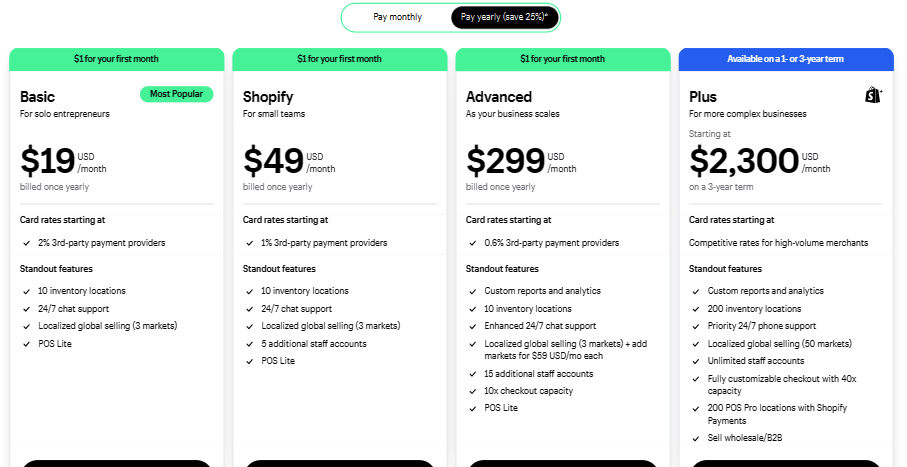
Mailchimp has a tiered pricing system that starts with a free plan, which includes up to 1,000 monthly email sends. As your needs grow, Mailchimp offers several paid plans with varying features and email volumes. The Essentials plan starts at $13 per month, the Standard plan at $20, and the Premium plan can go up to $350 per month. This allows businesses to scale their email marketing efforts and choose a plan that matches their budget and requirements.
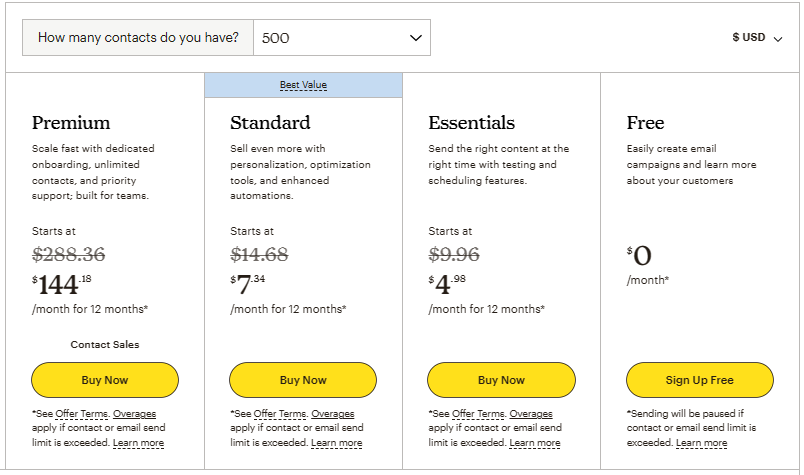
In conclusion, Shopify Email is a cost-effective solution for those already on the Shopify platform, especially for businesses that have a substantial number of emails to send each month. Mailchimp, with its more granular pricing tiers, offers flexibility for businesses of all sizes, allowing them to choose a plan that best fits their email marketing strategy and budget. Your choice should be based on your current email volume, expected growth, and the specific features you need for your campaigns.
5. Email Deliverability: Shopify Email vs Mailchimp
Email Deliverability is a crucial factor when comparing Shopify Email vs Mailchimp, as it directly impacts the success of your email marketing campaigns.
Shopify Email benefits from its direct integration with Shopify, which can lead to a smoother deliverability process for Shopify store owners. Since it’s built into the Shopify ecosystem, it’s optimized to work well with the platform, potentially leading to fewer deliverability issues. However, being a relatively new player in the email marketing space, it may not have the same level of sophisticated deliverability infrastructure as more established platforms.
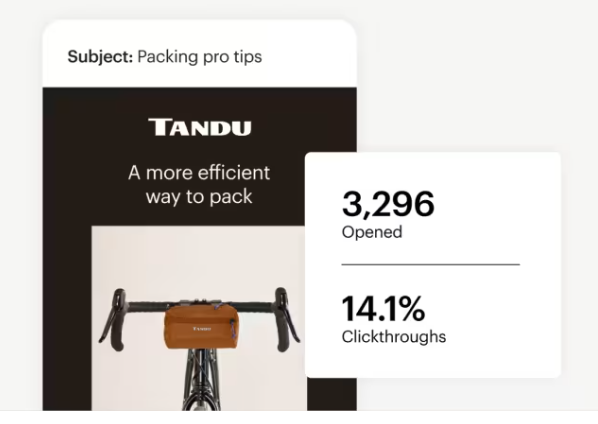
Mailchimp has been in the email marketing game for a long time and has developed a strong reputation for high deliverability rates. It has robust systems in place to manage bounces, spam complaints, and to maintain a good sender reputation. Mailchimp also provides users with detailed reports on deliverability and performance, allowing for better tracking and optimization of email campaigns.
In conclusion, while Shopify Email offers the convenience of integration and ease of use for Shopify users, Mailchimp brings years of experience and a proven track record in email deliverability. Your choice between Shopify Email and Mailchimp should consider not only the deliverability features but also how they align with your overall marketing strategy and technical requirements.
6. Customer Support: Shopify Email vs Mailchimp
When comparing Customer Support in the context of Shopify Email vs Mailchimp, it’s essential to consider the type of support provided and how it aligns with your business needs.
Shopify Email offers customer support primarily through the Shopify platform, which includes access to a comprehensive help center, community forums, and 24/7 support via email, live chat, and phone. The integrated nature of Shopify Email means that support is streamlined within the Shopify ecosystem, providing a consistent experience for users.

Mailchimp provides customer support through various channels such as live chat, email support tickets, and an extensive knowledge base. It also offers a wealth of online resources, including guides, tutorials, and a community forum. For more complex issues, Mailchimp’s paid plans include priority support, ensuring that users get the help they need promptly.
In summary, Shopify Email provides a convenient and integrated support experience for Shopify users, while Mailchimp offers a more varied range of support options, including priority support for complex issues. Your choice between Shopify Email and Mailchimp should take into account the level of support you anticipate needing and the resources you prefer to have at your disposal.
7. Templates and Design: Shopify Email vs Mailchimp
The Templates and Design aspect is a vital component in the comparison of Shopify Email vs Mailchimp, as it greatly influences the visual appeal and effectiveness of your email campaigns.
Shopify Email offers a range of customizable templates that are specifically designed for e-commerce businesses. These templates are easy to use and can be quickly edited to include brand logos, colors, and product details. The design process within Shopify Email is straightforward, allowing users to create professional-looking emails without needing extensive design skills.
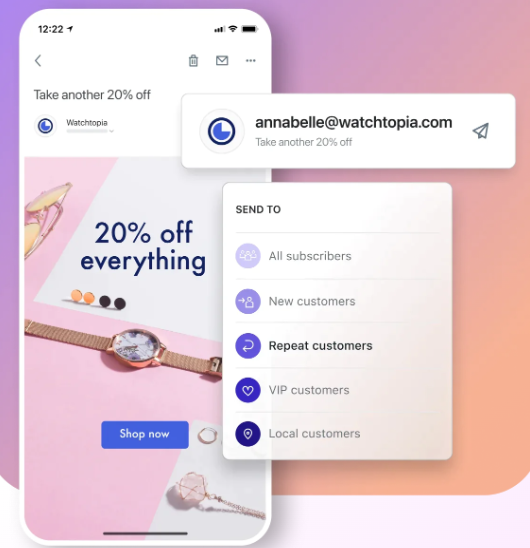
Mailchimp provides a more extensive library of email templates, catering to a wide variety of styles and purposes. Its powerful drag-and-drop editor offers greater flexibility and customization options, enabling users to craft unique and sophisticated email designs. Mailchimp’s templates are known for their modern aesthetics and are well-suited for businesses looking to create more intricate email layouts.
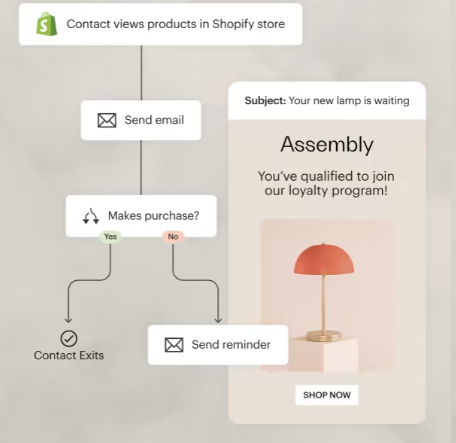
In essence, Shopify Email is geared towards users who prefer simplicity and ease of use, with templates that integrate seamlessly with their Shopify store. Mailchimp, however, stands out for those who desire a broader selection of templates and more control over the design elements of their email campaigns. Your choice between Shopify Email vs Mailchimp should be guided by the level of design complexity you’re comfortable with and the visual impact you want to achieve in your email marketing.
8. Analytics and Reporting: Shopify Email vs Mailchimp
In the realm of Analytics and Reporting, the comparison between Shopify Email vs Mailchimp reveals distinct approaches tailored to their respective platforms.
Shopify Email provides a straightforward analytics dashboard that’s integrated within the Shopify admin. Users can easily track the performance of their email campaigns with metrics such as open rates, click-through rates, and sales generated from emails. This integration allows for a quick overview of how email marketing efforts are contributing to store performance.
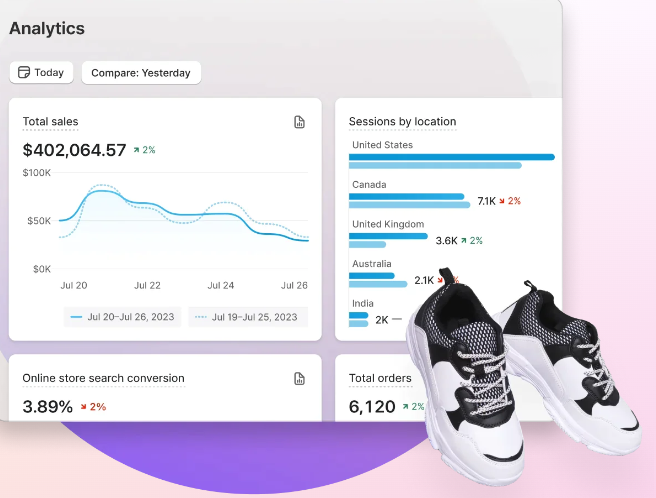
Mailchimp offers a more comprehensive analytics suite. Users have access to detailed reports on campaign performance, audience insights, and comparative reporting. Mailchimp’s analytics are designed to help users delve deeper into their data, understand subscriber behavior, and refine their marketing strategies based on these insights.
In essence, Shopify Email is suited for those who need a simple, integrated solution for tracking the essential metrics of their email campaigns, while Mailchimp caters to users who require detailed analytics and the ability to perform in-depth analysis of their email marketing efforts. The choice between Shopify Email and Mailchimp will depend on the complexity of the analytics you need and how closely you wish to monitor and act upon your email marketing data.
9. Scalability: Shopify Email vs Mailchimp
When discussing Scalability in the context of Mailchimp vs Shopify Email, it’s important to consider how each platform can grow with your business.
Shopify Email is designed to scale with your Shopify store. It’s a convenient option for those who are already using Shopify and want a simple, integrated email marketing solution. As your customer base grows, Shopify Email allows you to send more emails and reach a wider audience without leaving the Shopify environment.

Mailchimp is known for its ability to scale with any business size. It offers a variety of plans, from a free tier suitable for small businesses to more advanced options that can handle the needs of large enterprises. With Mailchimp, you can increase your subscriber list size, send volume, and access more sophisticated features as your business expands.
In summary, Shopify Email is ideal for those who prefer a straightforward, Shopify-centric approach to scaling their email marketing, while Mailchimp offers more flexibility and a broader range of features for growing businesses. The choice between the two will depend on your specific needs and how you envision your business evolving in the future.
10. User Reviews and Community: Shopify Email vs Mailchimp
The User Reviews and Community section is a significant part of the Shopify Email vs Mailchimp comparison, as it reflects real-world usage and satisfaction.
Shopify Email has garnered positive feedback for its ease of use and seamless integration with the Shopify platform. Users appreciate the convenience of managing their email marketing directly from their Shopify dashboard. The community around Shopify Email is growing, with many users sharing tips and best practices within the Shopify community forums.

Mailchimp, with its longer presence in the market, has a vast and active community. Users often cite the platform’s extensive features and flexibility as key benefits. However, some users mention a steeper learning curve due to its robust functionality. Mailchimp’s community forums and third-party sites are rich resources for troubleshooting, tips, and user-generated content.

In summary, Shopify Email tends to receive praise for its integration and user-friendliness, particularly from those within the Shopify ecosystem, while Mailchimp is often lauded for its comprehensive features and strong community support. Prospective users should consider not only the platforms’ capabilities but also the level of community engagement and support they desire when making their choice.
Conclusion: Shopify Email vs Mailchimp
In conclusion, when weighing the pros and cons of Shopify Email vs Mailchimp, it’s evident that both platforms offer unique benefits tailored to different business needs. Shopify Email excels in its seamless integration with the Shopify platform, making it a natural choice for those who prioritize ease of use and convenience within their Shopify environment. Mailchimp, with its extensive feature set and scalability, is ideal for businesses looking for a comprehensive email marketing solution that grows with them.
Your decision should hinge on several factors: the size of your business, the complexity of your email marketing campaigns, your budget, and how much value you place on aspects like design flexibility, analytics depth, and customer support. While Shopify Email might be the more cost-effective and straightforward option for Shopify store owners, Mailchimp offers greater versatility and advanced features for those willing to invest in a more robust system.
Ultimately, the choice between Shopify Email vs Mailchimp should align with your long-term business goals and marketing strategies. By carefully considering each platform’s offerings and how they match your requirements, you can select the email marketing tool that will best support your business’s growth and success. 🚀
Further Reading
Moosend Review: Unleashing the Top 8 Features of this Incredible Platform
Moosend vs Mailchimp: Unveiling the Best Email Marketing Tool
Builderall vs Clickfunnels: Discover the Superior Platform in 7 Steps
GetResponse Alternatives: 7 Best Alternatives for Your Email Marketing Requirements





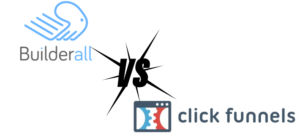
Pingback: Kajabi vs Clickfunnels: 7 Powerful Factors for the Best Choice
Pingback: Shopify vs ClickFunnels: A Comprehensive Comparison of 11 Key Aspects
Pingback: Comcast Email: 11 Reasons It’s the Best Choice for Your Business
Pingback: Shopify South Africa: 10 Powerful Reasons to Choose Shopify for Your Online Store